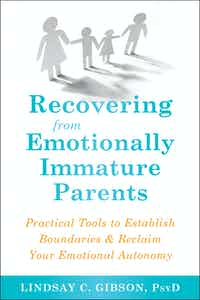Adult children of emotionally immature (EI) parents often feel guilty and ashamed when they don’t put their EI parent’s opinions and needs first. This self-doubt also makes them vulnerable to domination and criticism in their adult relationships. The following questions, asked in a gentle, quizzical tone, help clients shake off the immobilization that occurs when EI parents try to take over.
1) How come they seem more important than you? Have you noticed the implicit assumption that your parent’s feelings and opinions should be the center of everyone’s concern? Is it objectively true that your parent is inherently more deserving than you? How might this issue be resolved if you and your parent were equally important?
2) How exactly do they manage to make you feel bad? Notice where you sink inside when your parent treats you disrespectfully or forcefully. What does your parent do—or show on their face—to make you surrender what’s best for you, and instead worry about them? What if you decided not to feel bad for having your own preferences?
3) How did it get to be your job to protect your parent’s feelings? Do you really have to protect and rescue your parent from stressful emotions like anger, disappointment, or hurt? What are you afraid would happen if you didn’t jump in to save them from unpleasant experiences?
4) Do you have the right to your feelings and desires? Observe how fear of your parent’s ridicule or criticism makes you hide your inner world from them. Why does it feel embarrassing to be an individual with your own desires? Pretend you do know what’s best for you; if you didn’t have to worry about their reaction, what would you choose to do in this situation?
 Lindsay C. Gibson, PsyD, is a clinical psychologist in private practice who specializes in individual psychotherapy with adult children of emotionally immature (EI) parents. She is author of Who You Were Meant to Be, and writes a monthly column on well-being for Tidewater Women magazine. In the past, she has served as adjunct assistant professor of graduate psychology at the College of William and Mary, as well as at Old Dominion University. Gibson lives and practices in Virginia Beach, VA.
Lindsay C. Gibson, PsyD, is a clinical psychologist in private practice who specializes in individual psychotherapy with adult children of emotionally immature (EI) parents. She is author of Who You Were Meant to Be, and writes a monthly column on well-being for Tidewater Women magazine. In the past, she has served as adjunct assistant professor of graduate psychology at the College of William and Mary, as well as at Old Dominion University. Gibson lives and practices in Virginia Beach, VA.

 2024 Peace Playbook: 3 Tactics to Avoid Clashes with Your Partner
2024 Peace Playbook: 3 Tactics to Avoid Clashes with Your Partner